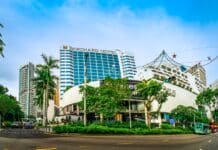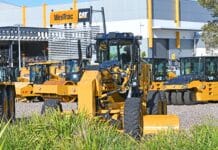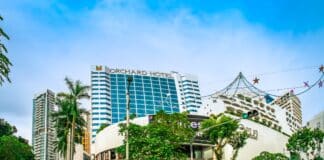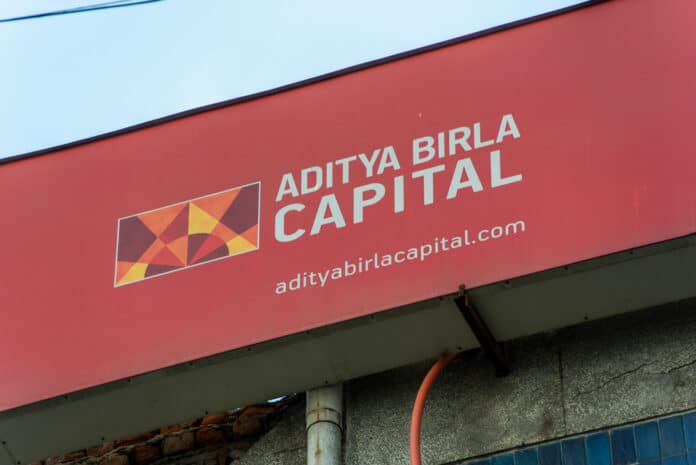
Family businesses are the backbone of India’s economy, accounting for nearly 80% of the nation’s GDP and over 90% of its listed companies. These enterprises are not only economic powerhouses but also pillars of corporate growth, with multigenerational involvement acting as a driving force. In fact, 70% of first- and second-generation members are actively engaged in their family’s ventures, ensuring their continuity and success.
Mumbai is India’s commercial and financial hub, boasting the highest GDP of any city in the nation and home to a rich tapestry of long-standing businesses, conglomerates, and financial institutions, as well as a thriving world-renowned entertainment industry. With its robust infrastructure, business-friendly policies, and vibrant startup ecosystem, the city continues to fuel growth across an increasingly widening range of sectors.
Here are the 10 largest family businesses in Mumbai:
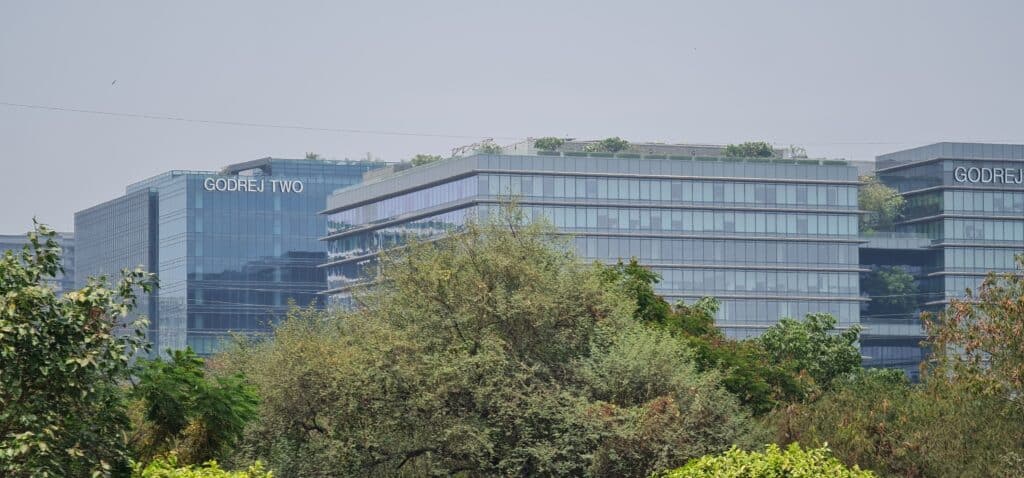
10. Godrej & Boyce Manufacturing
Owning/Controlling Family: Godrej
Annual Revenue: $2 billion
Godrej & Boyce is a pioneer in engineering solutions and branded manufacturing, with services spanning 10 diverse industries, including aerospace, construction, appliances, electrical, and security systems. Established in 1909 with the introduction of its original springless locking mechanism, the company quickly became synonymous with innovation. Over the following decades, Godrej & Boyce would apply its engineering innovations to a host of diverse consumer and business-grade products — from refrigerators and soap to forklifts, launch vehicle engines, and components for nuclear reactors. The company’s aerospace division, in particular, boasts an impressive track record, having produced and delivered over 200 liquid propulsion engines and more than 600 satellite thrusters.
Founded in 1897 by brothers Ardeshir and Burjorji Godrej, Godrej & Boyce is currently led by its third generation. Adi and Nadir Godrej hold Non-Executive Director positions, while cousin Jamshyd Godrej serves as the Group’s Managing Director and Chair.

9. Cipla Pharmaceutical
Owning/Controlling Family: Hamied
Annual Revenue: $2.9 billion
Cipla, India’s oldest pharmaceutical company, is a trailblazer in the healthcare industry, providing over 1,500 products across more than 80 countries. Founded by Dr K.A. Hamied, the company has remained family-run and deeply committed to its social mission since its inception.
Initially established to reduce India’s dependence on foreign pharmaceuticals, Cipla soon turned its focus to improving the availability and affordability of medicine for the country’s citizens. The company helped pioneer the manufacture of fixed-dose drug solutions, particularly beneficial for treating HIV/AIDS, tuberculosis, and asthma, in underdeveloped regions.
Three Hamied family members currently sit on Cipla’s board. Representing the family’s second generation, Dr. Y. K. Hamied heads the organisation as its Non-Executive Chair, with his brother M. K. Hamied as Non-Executive Vice Chair. The third generation is represented by M. K. Hamied’s daughter, Samina Hamied, who serves as Cipla’s Executive Vice Chair.

8. Sun Pharmaceutical Industries Ltd.
Owning/Controlling Family: Shangvi
Annual Revenue: $5 billion
Sun Pharmaceutical grew from just two employees and five products in 1983 to become the world’s fourth-largest generic pharmaceutical company, with a portfolio of over 2,000 products available in more than 100 countries. Founded by Dilip Shangvi, who now serves as Managing Director, the company was one of the first Indian pharmaceutical companies committed to research, investing up to 8% of its global revenues annually in research and development.
Today, Sun Pharma ranks among the top 10 generic pharmaceutical companies in the US and holds the second position by prescriptions in the generic dermatology market. It also dominates India’s pharmaceutical presence in emerging markets, with activities in over 80 countries, cementing its role as a global leader in affordable healthcare solutions.

7. Avenue Supermarts Ltd.
Owning/Controlling Family: Damani
Annual Revenue: $5.6 billion
Radhakishan Damani and his family revolutionised Indian retail with the launch of the D Mart supermarket chain in 2002, creating a one-stop solution for the growing needs of Indian families. The Damani’s Avenue Supermarts Ltd. also operates through its DMart Minimax, DMart Premia, DHomes, and Dutch Harbour brands, offering a diverse range of products — from groceries and fresh produce to home appliances, bedding, and apparel.
From its first store in Mumbai, DMart has scaled to 336 locations across India. Guided by its mission to be the lowest-priced retailer in every region in which it operates, the company continues to deliver value and convenience under the leadership of its Chairperson, Radhakishan Damani.

6. Mahindra & Mahindra
Owning/Controlling Family: Mahindra
Annual Revenue: $14 billion
Mahindra & Mahindra, a global multi-sector conglomerate, began as a steel trading business in 1945, co-founded by brothers JC and KC Mahindra alongside Ghulam Mohammed. The company entered the automobile and farm equipment sectors during the 1950s and 1960s, making its mark with its Jeep and Tractor brands.
In the 1980s, Mahindra & Mahindra diversified into telecom and IT, followed by the launch of its financial services division in the early 1990s. In 1996, the Group began developing its real estate business while continuing to expand its automotive and tractor product lines. Its popular Mahindra Bolero dominated the market by 2000, becoming India’s top-selling SUV for a decade.
Today, Mahindra & Mahindra operates in 100 countries, with over 60 manufacturing facilities and more than 260,000 employees. The company’s activities span nine sectors, including automotive, farm equipment, technology services, financial services, real estate, hospitality, and renewable energy. Anand Mahindra, grandson of co-founder Jagdish Chandra Mahindra, currently leads Mahindra & Mahindra as Group Chair.

5. JSW Steel Ltd.
Owning/Controlling Family: Jindal
Annual Revenue: $21 billion
JSW Group, one of India’s largest conglomerates, spans industries such as steel, energy, infrastructure, cement, paint, and venture capital. At its core is JSW Steel, the Group’s flagship business and India’s leading integrated steel company. Founded in 1982 by Om Prakash Jindal through the acquisition of a re-rolling mill, JSW Steel opened its first steel plant later that year. Today, the company operates 14 steel manufacturing facilities in India, in addition to plants in the US, Europe, and Africa, solidifying its position as a global industry leader.
The Jindal family continues to drive JSW Group’s legacy. Sajjan Jindal, son of the company’s founder, leads as Chair and Managing Director. Another son, Parth Jindal, heads the Group’s paint and cement segment, while daughter Tarini Jindal Handa serves as its reality division’s Managing Director. Sajjan’s mother, Savitri Devi Jindal, remains JSW Steel Chair Emeritus.
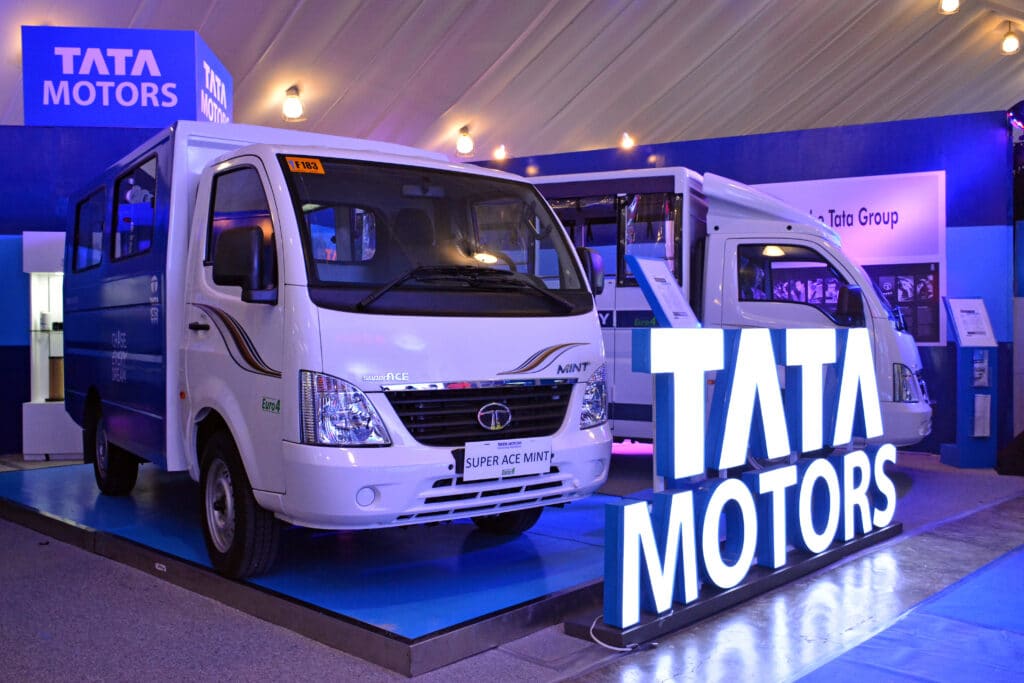
4. Tata Motors Ltd.
Owning/Controlling Family: Tata
Annual Revenue: $45 billion
Tata Motors, a cornerstone of the Tata Group and India’s largest automotive manufacturer, is a global leader in the industry. Founded in 1868 by Jamsetji Tata, the Tata Group initially operated as a trading company before diversifying into various sectors. Tata Motors was established in 1945 as a locomotive manufacturer, later entering the commercial vehicle sector through a joint venture with Daimler-Benz in 1954 and the passenger vehicle market in 1991 with the launch of its Tata Sierra sport utility vehicle.
Today, Tata Motors produces a diverse range of vehicles, including cars, SUVs, trucks, buses, and defence sector vehicles. Tata’s popular passenger vehicle brands include Tiago, Tigor, Altroz, Punch, Nexon, Safari, and Harrier. In 2008, Tata acquired the well-known automotive brand Jaguar Land Rover from the Ford Motor Company, enhancing its international presence. Tata Motors’ wide range of vehicles is available in over 125 countries through a network of 9,200 sales and service points worldwide. The Tata family oversees the company’s activities through its parent entity, Tata Sons.

3. Hinduja Group Ltd
Owning/Controlling Family: Hinduja
Annual Revenue: $50 billion
Founded in 1914 by Parmanand Deepchand Hinduja as a merchant banking and trade enterprise, Hinduja Group has evolved into one of the world’s largest and most diversified business conglomerates. Parmanand’s sons took over the business in 1971, expanding its global footprint by forming the Hinduja Bank in Switzerland and acquiring the well-known energy brand Gulf. In 1994, the company entered India’s banking sector with IndusInd Bank, further solidifying its financial services portfolio.
Over the years, Hinduja Group has steadily diversified into sectors such as automotive, information technology, media and entertainment, oil, banking, power generation, real estate, and healthcare. The company’s Ashok Leyland Limited subsidiary is India’s second-largest manufacturer of commercial vehicles and the fourth-largest manufacturer of buses globally.
Today, Hinduja Group is one of the largest diversified business groups in the world, operating in 38 countries with a workforce of over 200,000. Following the death in 2023 of Srichand P. Hinduja, the eldest son of the company’s founder, his brother, Gopichand P. Hinduja, now serves as the company’s Chair, working alongside their brothers, Prakash P. Hinduja and Ashok P. Hinduja, to steer the Group’s ongoing growth and legacy.

2. Aditya Birla Group
Owning/Controlling Family: Birla
Annual Revenue: $65 billion
The Aditya Birla Group, one of India’s most influential conglomerates, traces its origins to a cotton trading business founded by Seth Shiv Narayan Birla in 1857. The family enterprise grew significantly under Ghanshyam Das Birla, who diversified into textiles, aluminium, cement, and chemicals in the early 20th century. His grandson, Aditya Vikram Birla, later transformed the company into India’s first multinational company with operations in several sectors.
Today, Aditya Birla’s flagship enterprise, Grasim Industries Limited, is India’s largest Chlor-Alkali process chemicals company. The Aditya Birla Group oversees 57 brands through 32 businesses, with activities spanning 12 sectors in 37 countries. It is India’s leading provider of branded apparel, the nation’s top producer of grey cement and concrete, and the world’s leading aluminium rolling company.
Aditya Birla’s son, Kumar Mangalam Birla, chairs the Group’s board. His daughter, Ananya Birla, and son, Aryaman Birla, are Directors for Aditya Birla Management Corporation Private Ltd.

1. Reliance Industries Ltd.
Owning/Controlling Family: Ambani
Annual Revenue: $110 billion
Reliance Industries Ltd., India’s largest private sector company, began as a yarn trading business established by Dhirubhai Ambani in 1957. By 1977, the company had grown its textile operation into an IPO, with demand outpacing available shares seven times over. Leveraging a pioneering strategy of backwards integration, Reliance began establishing its own materials mills, eventually becoming the world’s largest integrated producer of polyester.
In 2000, Reliance expanded into the petrochemicals sector with its Jamnagar refinery and later revolutionised India’s mobile telecommunications sector by entering the country’s cellular market in 2002. By 2014, Reliance was India’s largest retailer by revenue, and in 2019, it became the first Indian company to achieve a market capitalisation exceeding ₹10 trillion.
Today, Reliance operates across multiple sectors, including exploration and production, petroleum refining, petrochemicals, retail, textiles, new energy, and telecommunications. Its Jio mobile and digital technology division, a leader in mobile and digital technology, serves over 439 million subscribers. Additionally, Reliance is the first Indian retailer to generate over $10 billion in annual revenue. Under the leadership of Mukesh Ambani, son of Dhirubhai Ambani, who serves as Chair and Managing Director, the company continues to set new benchmarks in innovation and growth.


